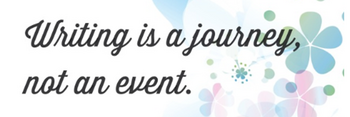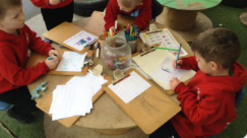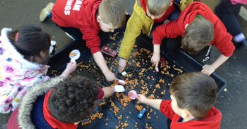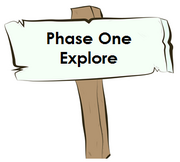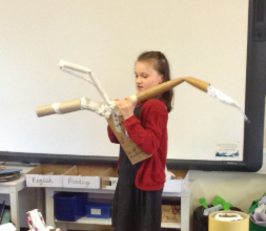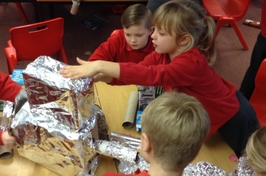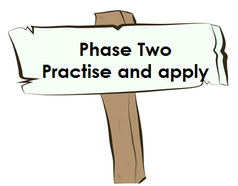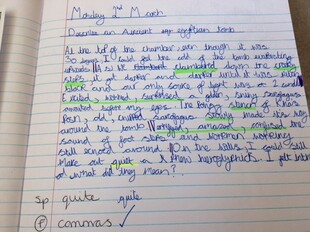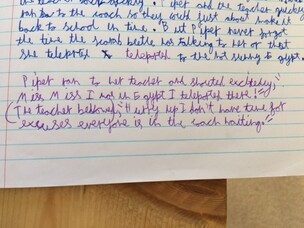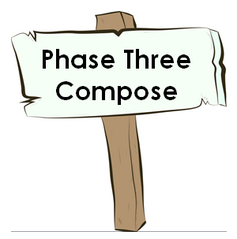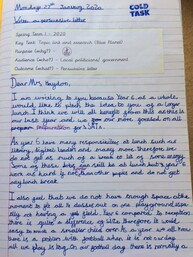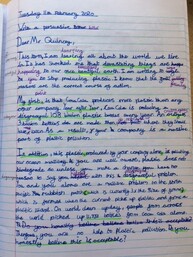Writing at the Tynings
Intent
Our aim is for children to develop a love for literacy and to demonstrate a clear understanding of the writing journey in order to establish themselves as writers in their own right. We will help to develop their knowledge of genre features, audience, language and effective composition. We have developed an English curriculum that is based around wonderful key texts that expose children to lots of rich and powerful vocabulary.
Tynings writers are creative, inspired and fluent; they have a clear understanding of the impact they want their writing to have on the reader and know how they will achieve this. They adapt, edit and revise their writing so every piece of writing they produce is to the best of their ability and better than the last.
Writing Journey at The Tynings School
Exploratory talk is positively encouraged to improve and develop children’s oracy skills. At the Tynings, we understand that talk is essential before the writing process is able to begin. Writing is based around key texts (Power of Reading) where children are immersed through for example re-telling, drama or art and cross-curricular links are made.
Writing in EYFS
EYFS use ‘helicopter stories’ which involve: groups acting out the story, turn-taking, understanding story structures, listening and attention skills, children being encouraged to tell their own stories then re-creating them in the provision indoors and outdoors.
Activities are carefully planned to support children’s fine motor skills to enable them to have the skills to be able to hold a pencil correctly and be fluent writers.
Children are encouraged and supported to apply their phonic skills in their independent writing.
EYFS children enjoying creating new mischief for the "Naughty Bus" getting inspiration from the story by Jan and Jerry Oke.
Y1 Writing
Y1 writing builds on the work from EYFS. Oracy is at the very heart of the curriculum; we understand the importance of talk (and listening) and have regular opportunities across the curriculum to share ideas and clarify thoughts. Phonics remains a big priority druing Year 1 and children have regular opportunities both in continuous provision and in adult-led activities to apply their phonics knowledge. Links between phonics and writing are explicitly made.
WAGOLLS are used to show children good examples of writing and to see skills 'in action'. Children are immersed in rich key texts and use these in their Writing to innovate parts of the story.
Children build on their sentence writing skills throughout the year and begin to show an understanding of the difference between fiction and non-fiction in their writing.
How we plan and teach Writing at the Tynings Y2 - Y6
Prior assessment
Every child produces a ‘cold task’ – this is their ‘have a go’ attempt at writing a particular genre or outcome. This is used to identify what needs to be the focus for the unit of work – both in terms of grammar knowledge and composition.
Immersion
We aim for children to be fully immersed in the key text and genre so lots of exciting opportunities are offered, for example: art work, drama, dressing up day etc. We positively encourage lots of exploratory talk to develop and hone children’s oracy skills.
_____________________________________________________________________________________________
Skills and composition focus
WAGOLLS are used to identify the focus grammar, punctuation, sentence structure, vocabulary or composition. Emphasis is on the audience and purpose: discuss the job that it is doing – how is it enhancing meaning?
Label it, teach it directly, and play with it.
We use short bursts for children to be able to apply a new skill whilst giving further practice for those that need it.
We use shared and modelled writing to demonstrate and teach the key skills.
Editing and Revising
Children are encouraged to become reflective writers; as part of this, editing and revising are key elements to become successful writers. Children consistently use their purple polishing pens to show examples of this.
Hot task
At the end of the writing journey, children will plan, draft and write a ‘hot task’ to showcase the elements they have learned in the unit of work.
Examples:
Cold task and hot task – persuasive letters
Audience and Purpose
Children will have a clear understanding of the audience and purpose. We aim to use ‘real life’ audiences as much as possible e.g. work showcased at Staple Hill Library, Bristol Museum, parents/carers during ‘Stay and Reads’, Buddies etc.
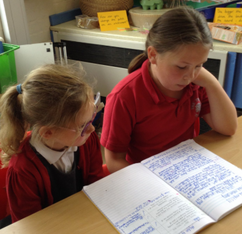 |
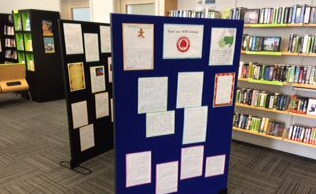 |
| Year 5 child reading her work to her younger Buddy | Children's writing showcased at Staple Hill Library |
English working wall
In every classroom, we have an English working wall. They are used to display key vocabulary from our key text and modelled examples of the skills or composition being taught. They are designed to help children independently access their learning.
Spelling
We follow Jane Considine 'The Spelling Programme' across KS2 (Y2 from the Spring term) - this is on a 2-week timetable.
Week One:
an investigation and Go Grapheme Grafters
Week Two:
Daily 10-minute sessions to practise and apply spelling skills.
Children are expected to spot rules and apply these independently in their own writing.
Children also have a 'Focus Five' - these are 5 words that have been identified in their writing that they need to work on in any piece of writing.
Writing across the curriculum
Teachers will provide opportunities for pupils to practise and apply their writing skills across the curriculum by creatively making links where there is opportunity. Children will display their learning about a particular topic within a double page spread.
How you can help at home
Here are some useful websites that you can use at home to support your child’s writing skills:
Click here to view the Pobble365 website
Click here to view the Imagination Tree website
Click here to view the Spelling Frame website
The English Lead at The Tynings School is Hannah Curtis. The governor with responsibility for English is Ros Steward. Please do not hesitate to contact us if you have any questions about English at The Tynings School
HANDWRITING
At the Tynings, we place great value and importance on the presentation of work. We expect each child to take pride in their work and to produce their best possible work each and every time.
Our progression in Handwriting
